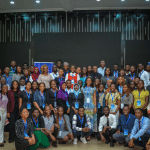The International Research School of Battery Chemistry, Characterization, Analysis, Recycling and Application (BACCARA) funded by the state of North Rhine-Westphalia and established at the University of Münster, Germany, by the Faculty of Chemistry and Pharmacy and the MEET Battery Research Center is seeking to fill
Application Deadline: 15th February 2021
Eligible Field(s):
• Theory and Modelling
Theoretical work is conducted on very different length- and time-scales: ab initio methods for the description of reaction processes, for the determination of electrochemical stabilities, and for the optimization of force fields; molecular dynamics simulations for improved understanding of structural and kinetic processes in electrolytes in particular also close to interfaces; machine learning concepts for an improved analysis of experimental and simulated data. Of particular importance is a digitization concept for sensibly structured data storage and future-oriented exchange of scientific data with the aim of efficient further processing.
• Material Synthesis
Within this research focus, new molecules and solid materials are to be synthesized in a targeted manner in order to positively influence key performance parameters such as internal resistance, temperature windows, battery life and intrinsic cell safety. The development of improved and sustainable synthesis pathways is also an important element. Furthermore, surface chemistry and physical properties play a decisive role in the establishment and optimization of new cell chemistries and battery cell production e.g. increased adhesion between the active material and current collector foil, or better binding of binder molecules to the surface of the active material particles. Another relevant focus is the development of strategies for aqueous processing of nickel-rich active cathode materials.
• Catalysis
In the field of lithium-ion batteries, catalysed reactions are of particular interest. The time- and cost-intensive formation step after assembly and during the first charge is essentially based on a polymerization reaction of electrolyte constituents and lasts from several hours to days. Polymer-based Solid State Batteries (SSBs) represent a broad field of research for catalysis research. Catalytic reactions for improved and sustainable synthesis of polymer electrolytes are to be researched and optimized within the framework of the research school. In addition, the understanding of catalytic decomposition processes can lead to an increase in the service life of materials and products, and a reduction in risks.
• Analysis and Characterization
Individual molecular and solid materials, but also the complex system “battery cell”, require a broad portfolio of methods and proven experts for local and global material analysis in order to characterize different interfaces and interphases and investigate the micro- and nanostructures of pure substances and composites. Reaction mechanisms and complex interactions in the overall context of electrochemical systems have to be elucidated and, as a result, targeted modifications have to be made so as to improve stability and performance and continue to meet ever-increasing requirements. In addition, analytical investigations provide valuable information about details of dynamic processes, ion mobility and structure-property-performance relationships. Finally, model materials, e.g. pure materials, single crystals, or thin film electrodes allow mechanistic investigations that are difficult to perform with complex materials and electrodes.
• Battery Cell Technology
On the one hand, the battery cell serves as a technological demonstrator for developed materials. All developments of the previously described research disciplines converge in this research area. They are thoroughly electrochemical with regard to their interaction with the “battery cell” system and subjected to an in-depth post-mortem analysis (field of activity: “analysis and characterization”) in order to elucidate reaction mechanisms and damage patterns. These findings are reflected back to the respective focal points and the materials are iteratively optimized.
On the other hand, the field of activity of “battery cells” is an independent, highly interdisciplinary research subject. The battery cell combines scientific and engineering challenges and represents an interface technology where the complex interplay of mechanical-structural, chemical and morphological characteristics is investigated.
All developments in the fields of activity above converge in the “battery cell” research area. The amount of electrochemical and analytical data generated will be correspondingly large.
• Recycling, Sustainability and Life Cycle Analysis
The successful and sustainable recycling of a battery cell begins with the design of the materials and the manufacture of the components. According to the so-called “Design for Recycling” practice, innovative materials and processes are researched that enable the use of materials and, in the best case scenario, individual components (e.g. electrodes) with minimal performance losses.
A battery cell consists of valuable raw materials that must be fed into the materials cycle and thus also back into the value-added cycle. Life cycle analyses can also be used to develop processes that enable the most energy-efficient separation and recovery of the individual cell materials, either as components or as raw materials. In addition, the findings are to be reflected in material synthesis and the battery cell topic complex in order to pave the way for the development of battery cells, constituent components and materials that are as sustainable as possible.
Type: PhD
Eligibility: We are looking for highly motivated and talented PhD students from different disciplines. Excellent command of spoken and written English, general communication skills and team spirit are essential. We are offering a competitive, interdisciplinary environment with a track record of intense collaboration. In addition to the individual training-through-research, our program includes further opportunities such as an introduction to electrochemistry and battery technology, retreats, international conferences and symposia.
Requirements:
- Master’s degree in the field of chemistry
- Documented knowledge in one of the above-mentioned topics
- Independent, structured approach to research work
- High motivation, initiative and team spirit
- Excellent command of English language
- German language skills are not a requirement, but a willingness to learn is desirable.
The University of Münster is an equal opportunity employer and is committed to increasing the proportion of women academics. Consequently, we actively encourage applications by women. Female candidates with equivalent qualifications and academic achievements will be preferentially considered within the framework of the legal possibilities. The University of Münster is committed to employing more staff with disabilities. Candidates with recognised severe disabilities who have equivalent qualifications are given preference in hiring decisions.
Eligible Countries: International
To be Taken at (Country): University of Münster, Germany
Number of Awards: 1
Value of Award: We will provide a structured 3-year, cutting-edge PhD training program in and beyond the fields mentioned above. PhD students are encouraged to choose their own field of research in close cooperation with their supervisor. In addition, courses in electrochemistry and a program of workshops, lectures and conferences, partly be organized by the students themselves, will bepart of the training.
Duration of Award: 3 years
How to Apply: Please send your complete CV, a cover letter outlining your motivation for battery research (maximum 1 page) and your scientific interests (maximum 1 additional page) detailing, which of the fields of activity listed above would be of specific interest to you with the subject heading “BAC-COH21-1” by e-mail to the address below before 15 February 2021 to:
Dr Kerstin Neuhaus E-Mail: baccara@uni-muenster.de
- It is important to go through all application requirements in the Award Webpage (see Link below) before applying.
- GOODLUCK
Visit Award Webpage for Details









